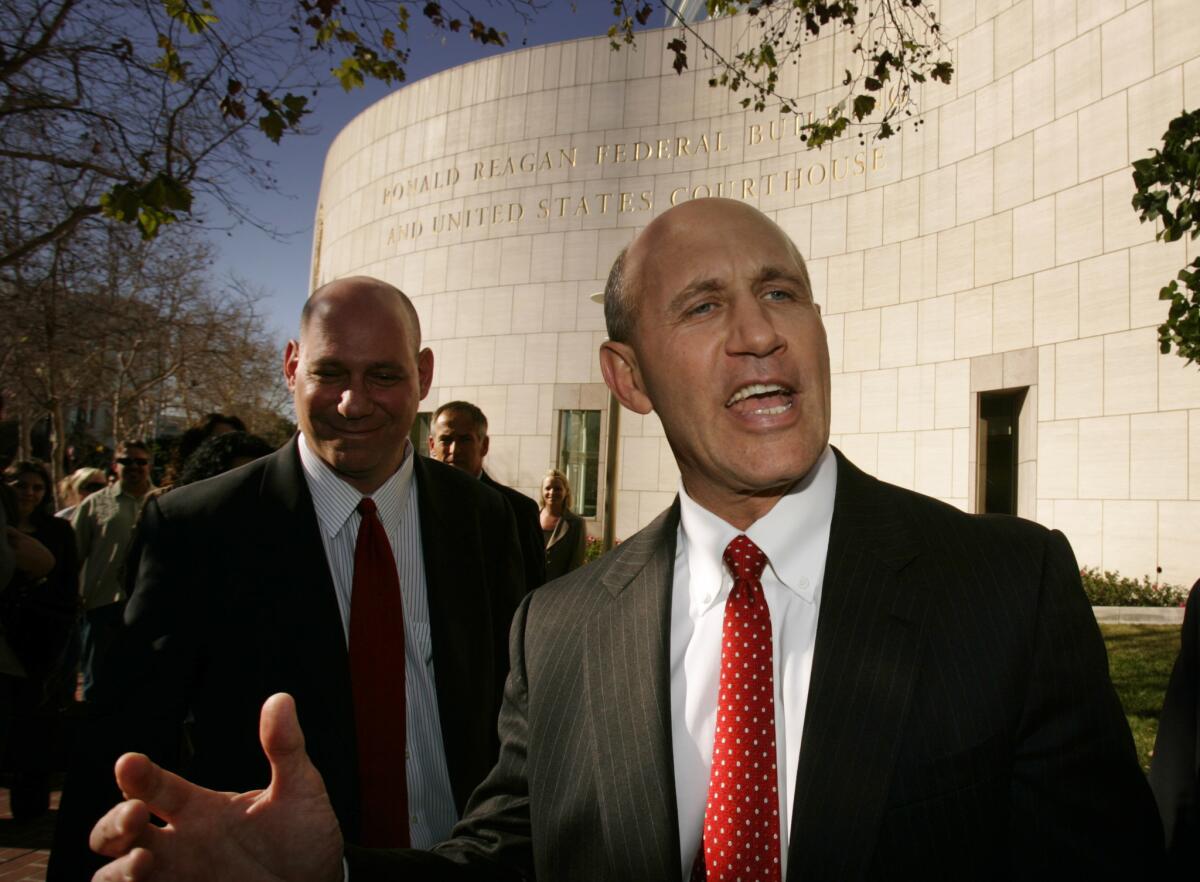Amid movement against police brutality, former O.C. sheriff and convicted felon collects big pension

As the national movement against police brutality and corruption continues, former Orange County Sheriff and ex-convict Mike Carona is quietly collecting an annual pension of more than $200,000.
Carona was convicted for attempting to obstruct a grand jury investigation and sentenced to 5½ years in prison in 2009, though he was released 14 months early.
A jury acquitted Carona of prosecutors’ claims that he misused his office to accept secret cash payments and provided badges and concealed weapons licenses to campaign contributors.
Jurors said after the trial they believed he had accepted cash and gifts, but they weren’t able to consider that due to a statute of limitations that prevented them from considering acts committed after October 2002.
According to Transparent California, Carona collected a pension of $227,136 in 2019. Between 2013 and 2018, the pension ranged from $212,332 to $234,530.
Carona’s high pension has garnered new meaning amid a national movement against police misconduct.
“Does Carona really need $220,000?” said Rose Ochoa, founder of Transforming Justice OC. “... Definitely $220,000 does not make sense.”
Arush Mehrotra, a 16-year-old Irvine high school student, is balancing distance learning, applying to college and social justice work.
She continued: “Carona’s not thinking about what that actually means, what the witness tampering did, how many lives that impacted. Because he’s able to live comfortably off of his pension and whatever additional financial support he has.”
Carona declined to comment through his attorneys.
Zoe-Raven Wianecki, who runs OC Protests, said law enforcement officers like Carona should be stripped of their pensions for committing misconduct.
“It’s definitely not uncommon for police officers to lose their jobs and be able to continue to retain the taxpayers’ dollars, which is absurd,” Wianecki said.
“Police know they are going to be protected no matter what. That has to be one of the first things to go when we talk about defunding police is allowing police to retain these absurdly large pensions.”
Wianecke has been one of the leading architects of the anti-police-brutality movement in Orange County. OC Protests has been a primary source for many activists looking to get involved with the Black Lives Matter movement following the killing of George Floyd.
“Look, any time a cop steps out of line, if they lose their job and their pension, it would just create a much larger and greater deterrent to police brutality and misconduct,” Wianecke said.
While some may feel Carona is undeserving of his pension, it is protected by law, which dictates that pension benefits are only lost for prospective years after the crime was committed. Carona worked for 32 years prior to his conviction.
“The reason they did it that way was they were concerned that taking away pension benefits that already had been earned prior to the date of misconduct would be unconstitutional,” said Lawrence Rosenthal, a Chapman University law professor.
The California and federal constitutions have provisions that make it unconstitutional to “impair the obligation of a contract.” In other words, Rosenthal said if the government promises you something, it has to keep its promise.
“They can’t decide, you know what, we’re no longer wanting to honor our contractual obligations and that includes pensions because that’s a kind of contract,” said Rosenthal, who specializes in civil rights, criminal law and criminal justice.
“The fact that Sheriff Carona did such a crummy job running his office up to and including the badge-selling scheme — although he was convicted of witness tampering rather than badge-selling bribery — and that he’s still making all this money, is of course quite distressing,” Rosenthal said. “But you know, constitutional rights often lead to distressing results.”
All the latest on Orange County from Orange County.
Get our free TimesOC newsletter.
You may occasionally receive promotional content from the Daily Pilot.





